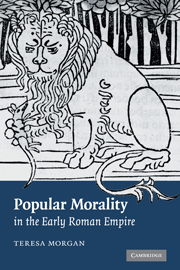Book contents
- Frontmatter
- Contents
- Preface
- List of illustrations
- List of tables
- List of abbreviations
- 1 Introduction
- PART ONE
- PART TWO
- 7 The language of morality
- 8 Moral authorities
- 9 Time and morality
- PART THREE
- Conclusion
- Appendix 1 The political and literary connections of Babrius
- Appendix 2 The definition of a miscellany
- Appendix 3 Popular morality and philosophical doctrine
- List of papyri
- Bibliography
- Index
8 - Moral authorities
Published online by Cambridge University Press: 27 October 2009
- Frontmatter
- Contents
- Preface
- List of illustrations
- List of tables
- List of abbreviations
- 1 Introduction
- PART ONE
- PART TWO
- 7 The language of morality
- 8 Moral authorities
- 9 Time and morality
- PART THREE
- Conclusion
- Appendix 1 The political and literary connections of Babrius
- Appendix 2 The definition of a miscellany
- Appendix 3 Popular morality and philosophical doctrine
- List of papyri
- Bibliography
- Index
Summary
Authority without wisdom is like a heavy axe without an edge, fitter to bruise than polish.
Anne Bradstreet, Meditations Divine and MoralIn the last chapter we began to look at why, in popular sayings and stories, certain actions and qualities are regarded as good or bad. This chapter pursues the same question from a different angle, by looking at the authorities which are cited or implied as reasons why one should think or behave in certain ways. There are many: the gods, nature, myth, history, geography, institutions, good men, famous authors and more abstract powers like consequence (about which we shall have more to say in the next chapter). We therefore need also to ask how authorities are ranked in principle: does that of the gods always outweigh that of humans, for instance, or that of institutions that of individuals, or are there no detectable rules? How does principle relate to practice? When ethical dilemmas arise, does any one group have more say than another in deciding to what authority to appeal? To be persuasive, does a saying or story need to appeal to more than one authority, or is one enough?
THE GODS
Popular morality shows a strong desire to anchor human virtue in something outside the human sphere. We have already seen some of the ways in which the gods act as moral authorities. They reward piety and justice and punish impiety and injustice. They are described as doing good to good people.
- Type
- Chapter
- Information
- Popular Morality in the Early Roman Empire , pp. 207 - 234Publisher: Cambridge University PressPrint publication year: 2007



